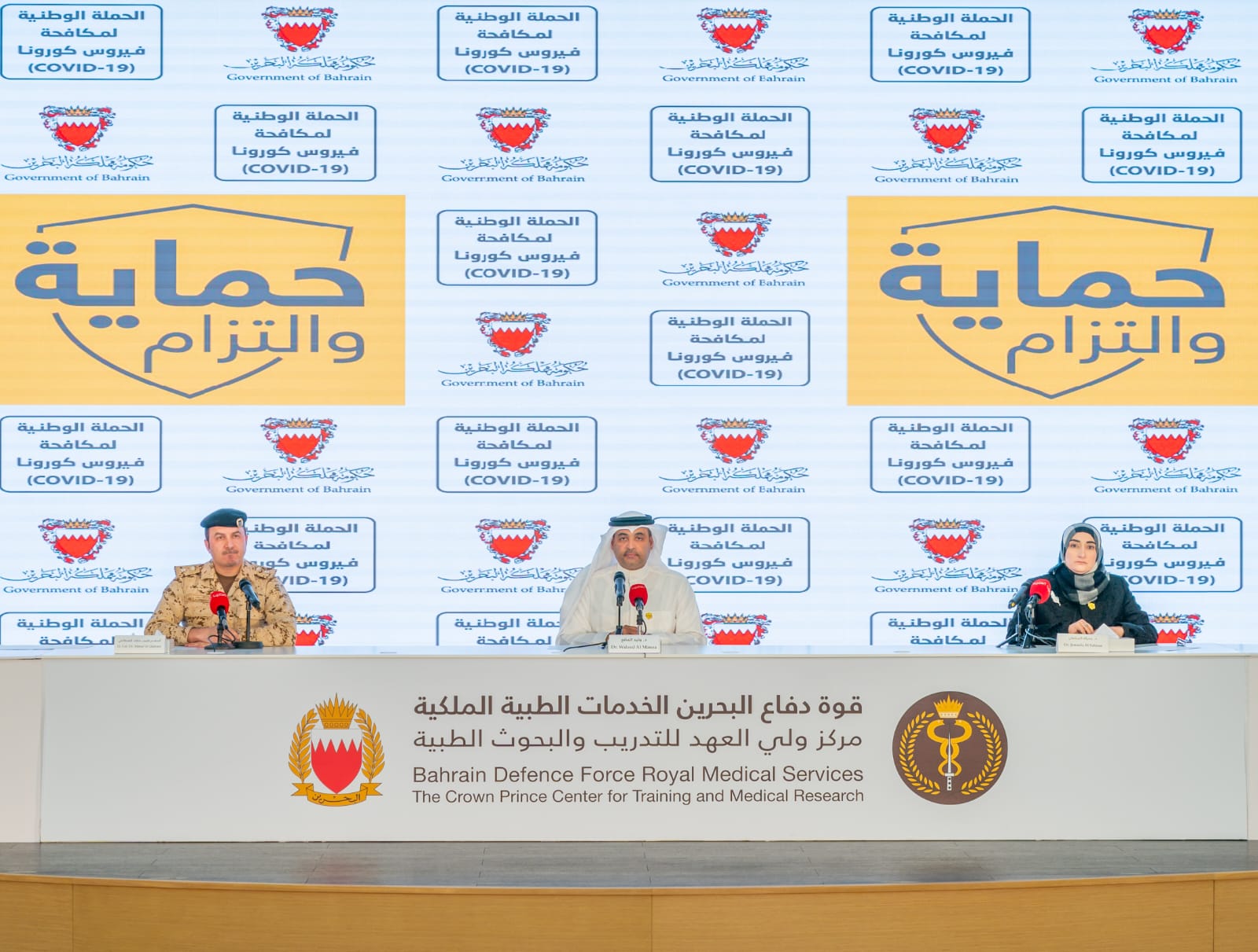The National Medical Taskforce announces the continuation of the Yellow Alert Level until 14 February

The National Medical Taskforce for Combatting the Coronavirus (COVID-19) today held a press conference to provide an update on the Kingdom’s COVID-19 response, at the Crown Prince Centre for Training and Medical Research, in Bahrain’s Defence Force Hospital.
Following approval by the Government Executive Committee, the Taskforce announced that the Kingdom will remain on the Yellow Alert Level until 14 February, 2022.
The Taskforce noted that this decision was made to maintain the progress of national efforts to combat COVID-19, to preserve public health.
HE Dr Waleed Khalifa Al Manea, Undersecretary at the Ministry of Health and member of the National Taskforce for Combatting the Coronavirus (COVID-19), stressed the need for everyone to adhere to the previously announced Yellow Alert Level procedures.
HE Dr Al Manea noted that health inspections are continuing, and violators will be penalised in accordance with the Kingdom's legal frameworks.
HE Dr Al Manea urged eligible individuals to head to the previously announced health centres to receive a booster shot without the need to make an appointment.
Additionally, the importance of immediately testing for COVID-19 when experiencing any COVID-19 related symptoms, in order to preserve public health, was stressed.
Noting that all should be aware that the rise in existing cases with the emergence of a new variant is likely, in line with current national COVID-19 efforts, HE Dr Al Manea said that that the current focus is on maintaining the low number of patients requiring treatment in hospital or intensive care units. Adding that current levels reflect the success of The National Vaccination Campaign and other measures taken to protect public health.
For his part, Lt. Col. Doctor Manaf Al Qahtani, Infectious Disease Consultant and Microbiologist at the BDF Hospital, and member of the National Medical Taskforce for Combatting the Coronavirus (COVID-19), stated that the health and safety of citizens and residents continues to be a top priority .
Dr Al Qahtani noted that the National Vaccination Campaign was introduced with the aim of preserving public health, and since its inception until today, its procedures and protocols have been updated in accordance with international best practice.
Dr Al Qahtani highlighted the importance of getting fully vaccinated and receiving a booster shot, as vaccinations provide protection against COVID-19 by bolstering the body’s immunity.
Dr Al Qahtani also commented on the success of the National Vaccination Campaign, saying that ensuring community awareness has resulted in widespread acceptance of vaccination, with 94% of eligible individuals who are over 18 having received two vaccine doses, and 83% of eligible individuals having received a booster shot.
Dr Al Qahtani noted that the Kingdom of Bahrain has achieved success in immunising adolescents and children, as the vaccination rate for the 12 to 17 age group has reached 91%. The number of children aged 3 to 11 who received the vaccination reached more than 17,000, while the number of those registered to date has reached more than 25,000 children.
Dr Al Qahtani thanked parents for vaccinating their children, and called on those who have not to ensure their children are vaccinated soon in order to preserve their safety and the safety of those around them, and in support of national efforts to combat COVID-19. Noting that vaccinations and the booster shot have proven to be effective in reducing the severity of symptoms and mortality rates in case of infection.
Dr Al Qahtani called on all eligible individuals to get fully vaccinated, and take the booster shot, according to updated vaccination protocols that were announced as part of the National Vaccination Campaign.
For her part, Dr Jameela Al Salman, Infectious and Internal Diseases Consultant at Salmaniya Medical Complex, and member of the National Medical Taskforce for Combatting the Coronavirus (COVID-19), clarified that the changes in alert levels within the COVID-19 Alert Level Traffic Light System are based on the daily average number of cases in intensive care.
Dr Al Salman explained that the Taskforce may designate some dates as a higher alert level in the interest of public health and safety, and that the precautionary measures associated with each level are subject to change in accordance with the latest data and developments.
Dr Al-Salman further explained that the precautionary quarantine period for individuals who hold a green shield on the ‘BeAware’ application, will be seven days from the date of infection, and those individuals can exit quarantine after seven days without taking a PCR exit test.
Individuals who are unvaccinated or hold either a yellow or red shield on the ‘BeAware’ application, must quarantine for ten days from the date of infection and can exit quarantine after ten days without taking a PCR exit test.
Dr Al Salman highlighted the importance of quickly testing for COVID-19 when experiencing any COVID-19 related symptoms, as the early reporting of symptoms leads to quicker quarantining of existing cases and the reduction of the number of contacts, and has been shown to shorten their treatment and recovery time.
In conclusion, Dr Al Salman stressed the importance of continuing to adhere to all previously announced precautionary measures decisions to continue to successfully address the pandemic and preserve public health.


